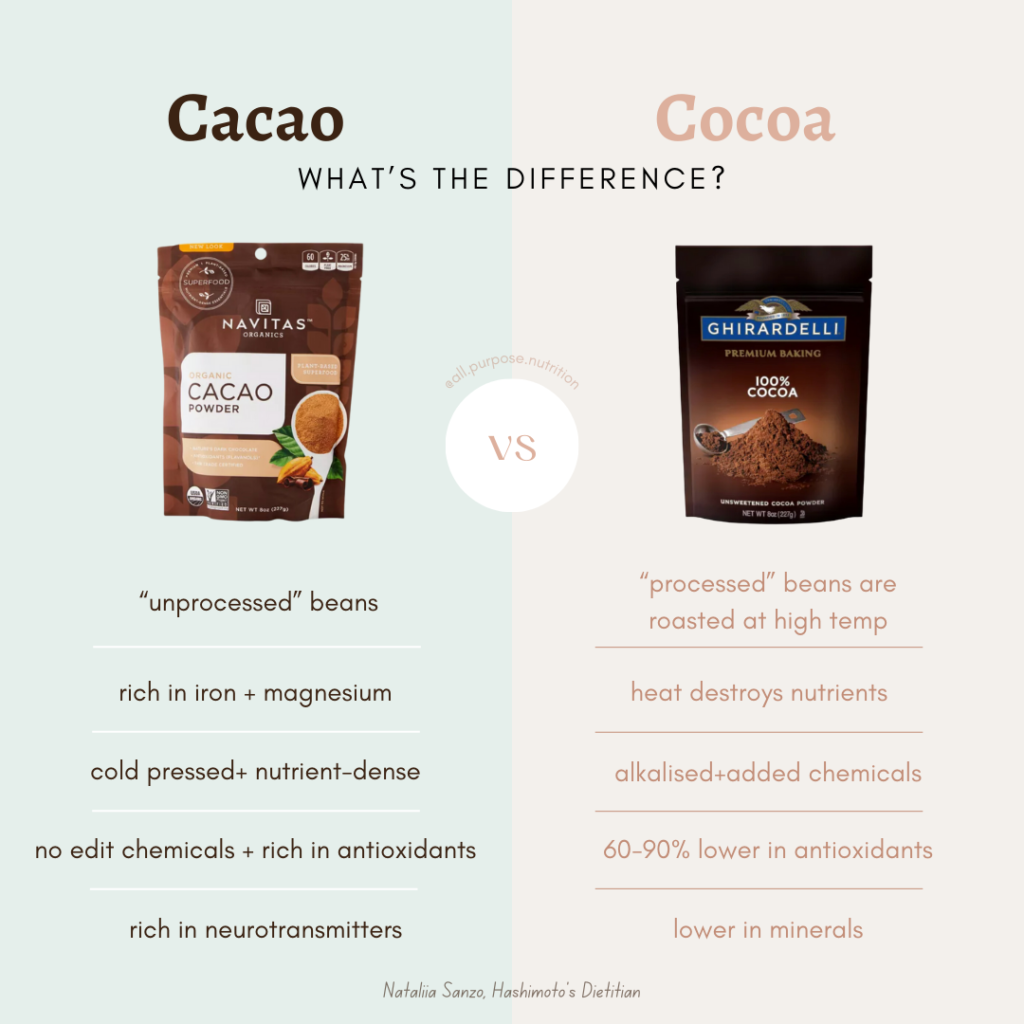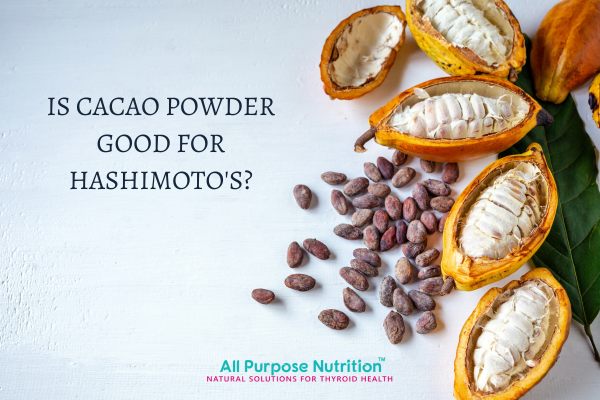Cacao, the raw, unprocessed form of chocolate, is gaining popularity for its potential health benefits, particularly for those managing Hashimoto’s hypothyroidism. Here’s an overview of how cacao might be beneficial:
1. Rich in Antioxidants
Cacao is packed with flavonoids, a type of antioxidant. Antioxidants are crucial for reducing oxidative stress, which is often elevated in autoimmune conditions like Hashimoto’s.These antioxidants can help in protecting thyroid cells from damage, potentially reducing the autoimmune response.
2. Magnesium Content
Cacao is a good source of magnesium, a mineral that plays a vital role in thyroid function. Magnesium contributes to the conversion of the thyroid hormone T4 into the more active form, T3.
Many individuals with Hashimoto’s have low magnesium levels, which can affect thyroid function and overall health.
3. Mood Enhancer
Cacao contains compounds like phenylethylamine (PEA) and anandamide, which can boost mood and alleviate depression. This is particularly beneficial as mood disorders are common in Hashimoto’s due to hormonal imbalances.
It also has small amounts of caffeine and theobromine, which can enhance alertness and energy levels, often needed in hypothyroidism.
4. Anti-Inflammatory Properties
The flavonoids in cacao exhibit anti-inflammatory properties. Since Hashimoto’s is an inflammatory condition, incorporating anti-inflammatory foods can be supportive.
By reducing inflammation, cacao might help in managing the autoimmune aspect of the disease.
5. Gut Health
Emerging research suggests that cacao can positively impact the gut microbiome, promoting the growth of beneficial bacteria and enhancing gut health. Since gut health is intricately linked with autoimmune conditions and thyroid function, cacao’s role in supporting a healthy gut microbiome can be particularly beneficial for those with Hashimoto’s.
Precautions
While cacao offers these potential benefits, it’s important to consume it in moderation. Cacao is high in oxalates, which can be problematic for some individuals, especially if they have a history of kidney stones. Also, opt for raw or minimally processed cacao to avoid added sugars and fats often found in processed chocolate products.Integrating Cacao into the Diet
- Smoothies: Add raw cacao powder to your morning smoothie.
- Yogurt: Mix cacao nibs with Greek yogurt for a healthy snack.
- Baking: Use cacao powder in baking for a healthier twist on desserts.
What is the difference between cacao and cocoa?
Understanding the differences between cacao and cocoa is important, especially when considering their nutritional impact on gut health, Hashimoto’s, hormone balance, antioxidant content, and weight loss. Let’s break down these differences:

1. Nutritional Profile
Cacao: Refers to the raw, less processed form of the chocolate. It’s made by cold-pressing unroasted cocoa beans, keeping the living enzymes in the cocoa and removing the fat (cacao butter).
Cocoa: Generally refers to the powder made from roasted, processed beans. The beans are processed at high temperatures, which can reduce the enzyme content and alter the nutritional profile.
2. Antioxidant Content
Cacao: It’s exceptionally high in antioxidants, particularly flavonoids. These antioxidants are crucial for reducing oxidative stress, which is often a concern in autoimmune conditions like Hashimoto’s.
Cocoa: While still containing antioxidants, the processing it undergoes typically reduces the levels compared to cacao.
3. Effect on Gut Health
Cacao: Its high flavonoid content can positively influence gut health by promoting the growth of beneficial bacteria and enhancing gut barrier function. A healthy gut is key in managing autoimmune conditions.
Cocoa: May still have beneficial effects on the gut microbiome, but they are likely less pronounced due to the reduced antioxidant content.
4. Impact on Hashimoto’s and Hormones
Cacao: The rich magnesium and antioxidant content can support thyroid function and hormone balance, which is crucial in managing Hashimoto’s. The mood-boosting chemicals in cacao can also help with the emotional and psychological aspects.
Cocoa: Can still provide some benefits, but the processing it undergoes may diminish its impact compared to cacao.
5. Weight Management
Cacao: Its high fiber content and minimal processing can make it more satiating, aiding in weight management – a common concern for those with Hashimoto’s.
Cocoa: Often contains added sugars and fats, especially in commercial preparations, which might not be as beneficial for weight management.
6. Overall Health Benefits
Cacao: Its higher nutrient and antioxidant profile makes it more beneficial for overall health, particularly for those with specific health conditions like Hashimoto’s.
Cocoa: Still offers health benefits but generally in a less potent form due to processing.
Which mood-boosting chemicals are in cacao?
Cacao contains several mood-boosting chemicals that contribute to its reputation as a feel-good food. These include:
1. Phenylethylamine (PEA)
Often referred to as the ‘love drug’, PEA is a natural compound that creates a feeling of excitement and happiness. It stimulates the release of endorphins and other pleasure-inducing chemicals in the brain, similar to the feelings experienced when falling in love.2. Anandamide
Known as the ‘bliss molecule’, anandamide is a neurotransmitter and endocannabinoid that is naturally produced in the brain. It binds to cannabinoid receptors and can create a sense of happiness and mental well-being. Cacao is one of the few foods known to contain anandamide.
3. Serotonin
While cacao doesn’t directly contain serotonin, it does have tryptophan, an essential amino acid that is a precursor to serotonin, a neurotransmitter that contributes to feelings of well-being and happiness. By boosting tryptophan levels, cacao can indirectly increase serotonin production in the brain.
4. Theobromine
Theobromine is a bitter alkaloid of the cacao plant, similar to caffeine but with a milder effect. It acts as a stimulant that can boost energy levels and improve mood. Unlike caffeine, theobromine has a slower onset and longer duration, providing a gentle, prolonged energy boost.
5. Magnesium
While not a neurotransmitter, magnesium plays a vital role in supporting mood and mental health. It regulates neurotransmitters and can help reduce stress and anxiety. Cacao is a rich source of magnesium.
How to Choose The Best Cacao Powder For Hashimoto’s
Selecting cacao powder, especially when you’re managing Hashimoto’s disease, involves careful consideration to ensure it supports your thyroid health. Cacao, in its raw form, is rich in nutrients and can be a healthy addition to your diet if chosen correctly. Here’s what to look for:
Organic: Choosing organic cacao powder is crucial. Organic products are free from pesticides and harmful chemicals, which can negatively impact thyroid function and overall health, especially in autoimmune conditions like Hashimoto’s. Raw and Unprocessed: Raw cacao powder is less processed than regular cocoa powder. This means it retains more of its natural nutrients, including antioxidants, magnesium, and iron, which are beneficial for managing Hashimoto’s. These nutrients can help in reducing inflammation and supporting thyroid function. No Added Sugars or Artificial Sweeteners: Look for cacao powder without added sugars or artificial sweeteners. Excess sugar can contribute to inflammation, insulin resistance, and other issues that may exacerbate Hashimoto’s symptoms. Tested for Heavy Metals: Cacao, like cocoa, can be contaminated with heavy metals. Opt for brands that test for and ensure low levels of heavy metals, as these can be harmful to thyroid health. Non-Alkalized: Choose non-alkalized cacao powder. The alkalization process can reduce the beneficial flavonoid content. Flavonoids are known for their antioxidant properties, which can be particularly helpful in managing autoimmune conditions by reducing oxidative stress. Ethical Sourcing: Ethically sourced cacao ensures fair trade practices and sustainable farming. While this doesn’t directly impact your health, it’s a responsible choice for the environment and farming communities.What About Lead and Cardamom In Cacao Powder?
When looking for cacao powder with the lowest levels of cadmium and lead, it’s important to understand that most cacao powders will contain some level of these heavy metals due to their natural presence in soil. However, some brands have been found to have lower levels based on independent testing.
The best cocoa powder overall was Navitas Organics Organic Cacao Powder, which reached 77 percent of CR’s lead limit and 17 percent of the cadmium limit. Navitas has a third party test all finished products for heavy metals to ensure low levels, according to the company website and Consumer report in 2023.
Another brand that ranks well in terms of low heavy metal content is Mountain Rose. Their cacao powder has been independently tested, showing 0.034 ppm of cadmium and less than 0.005 ppm of lead, which are comparatively low levels.
Additionally, brands like Viva Naturals Organic Cacao Powder and Terrasoul Cacao Powder have also responded to inquiries about their heavy metal content, providing recent certificates of analysis (COA) that indicate lower levels of cadmium and lead compared to other options in the market.
In summary. Cacao powders are unlikely to be 100% free from cadmium. However, some brands have been found to have lower levels based on independent testing: my personal favorite is Navitas Organics Cacao Powder, Viva Naturals Organic Cacao Powder, and Terrasoul Cacao Powder.
It’s important to keep in mind that heavy metal levels can vary by batch and production, so if you’re looking for the most accurate and up-to-date information, it’s best to request the most recent test report or COA from the brand you’re considering.
For those managing Hashimoto’s disease, it’s crucial to be mindful of these heavy metal levels as they can impact overall health. While cacao powder can be a healthy addition to your diet due to its antioxidant properties, ensuring that you’re choosing a brand with lower levels of cadmium and lead can help in avoiding potential negative health impacts. Remember, moderation is key, and it’s always advisable to consult with your healthcare provider or a registered dietitian for personalized dietary advice.
Although it’s nutrient-dense, it’s also potent and high in calories. A balanced approach, especially focusing on gut health, hair health, and hormone balance, is essential in managing Hashimoto’s. As with any dietary change, it’s important to observe how your body reacts and adjust accordingly. Remember, every individual with Hashimoto’s may have different sensitivities and responses to certain foods.
